Does Weed Killer Kill Plant Roots? How to Kill Weeds Naturally?
by Lee Safin
Killing weeds through traditional methods is an uphill task. That’s why most gardeners and farmers use weed killers to kill weeds and other plants. They are specially formulated to kill various types of weeds.
Does weed killer kill plant roots?
Yes, weed killers kill plant roots gradually, even if you spray the solution on the leaves. The herbicide will be absorbed throughout the whole body of the plant along with roots. That’s why weed killers are one of the best products to kill weeds and other harmful plants.
Contents
- Does Weed Killer Kill Plant Roots?
- Why Are Plant Roots Killed After Weed Killer Application?
- What Happens When Plants Roots Are Affected?
- How To Kill Weeds Naturally?
- How Long Does It Take For Roundup To Kill Plants Completely?
- Do You Need to Pull Weeds After Roundup?
- Do Vinegar Kill Weeds?
- Does Salt Kill Weeds?
- Will Vinegar + Salt Kill Weeds?
- How to Use Vinegar & Salt As a Weed Killer?
- How to Get Rid of Poison Ivy?
- Conclusion

Does Weed Killer Kill Plant Roots?
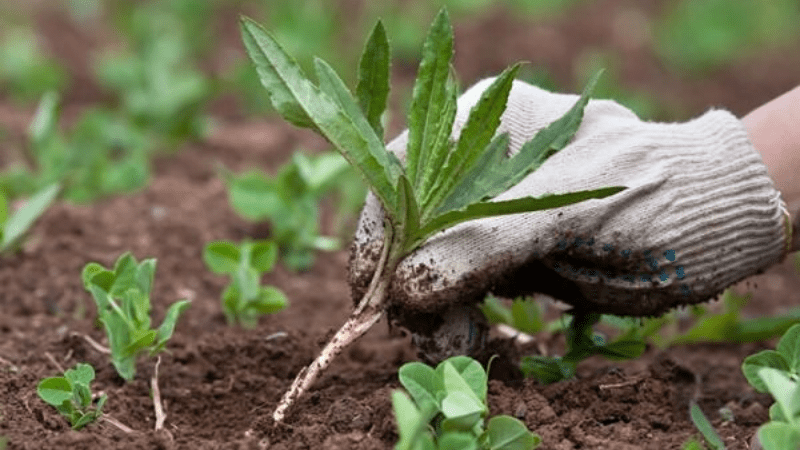
The most active ingredient a week killer has is Glyphosate. This powerful compound can kill various types of weeds and incendiary plants.
Weed killers either come in liquid-based, or they are mixed with water. Then, you spray them on the plants’ leaves carefully without harming beneficial plants.
After applying the herbicide on plants’ roots and leaves, they start to react slowly. The product stops the production of new enzymes for the plants.
Plants fail to thrive and survive since there is no sufficient balance of enzymes. Hence, they become weak and ultimately die.
Additionally, the compounds of weed killers will move to the soil. And, they will stay on the soil for several months, which is found by Cornell University in a study.
Why Are Plant Roots Killed After Weed Killer Application?
So, you are here to know, does weed killer kill plant roots? A plant root is one of the most parts for it as it performs various functions.
It helps plants to stay firmly in position during bad weather. Also, from absorbing water to nutrition to oxygen, plants perform a wide range of tasks. It works as a medium to move various things from one area to another of plants’ bodies.
When its root system becomes weak or infused with diseases, the whole plant may die. A study found that a considerable amount of chemicals from weed killers is absorbed in soils through plants’ roots.
What Happens When Plants Roots Are Affected?
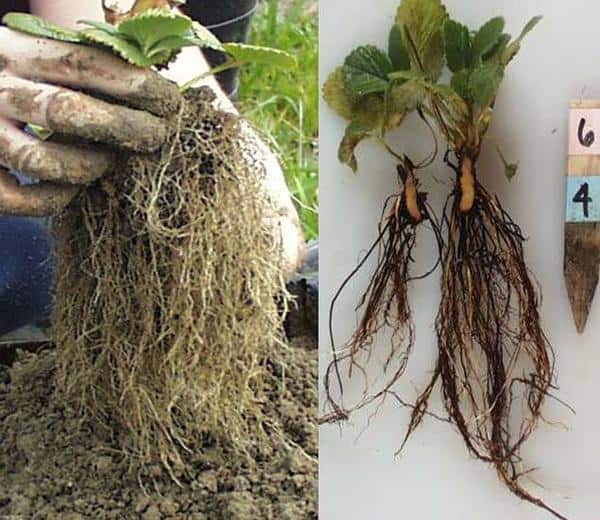
When the weed killer attacks plants’ roots and other body parts, it hampers plants’ health. Several diseases show up.
Moreover, it prevents plants from absorbing various nutrition from the soil. Their self-tolerant immune responses become weak.
You will notice several diseases on them, such as root rot, powdery mildew, bacterial canker, apple scab, downy mildew, etc. Finally, they die after several weeks.
How To Kill Weeds Naturally?
No matter how effective chemical solutions are, natural solutions are the best. Using natural products means no harm for plants, the environment, animals, and humans.
Killing weeds doesn’t always require chemical compounds. Things that already you have in our home can be an effective way to murder those foul weeds.
Before knowing how to kill weeds naturally, let’s look at various types of weeds. Get more ideas from the following article “how to get rid of weeds forever?”
| Bull Thistle | Spotted Knapweed | Orange Hawkweed |
|---|---|---|
| Green Foxtail | Ragweed | Slender Rush |
| Dandelions | Hedge Bindweed | Tall Fescue |
| Smooth Brome | Dodder | Deer Tongue |
1. Newspaper
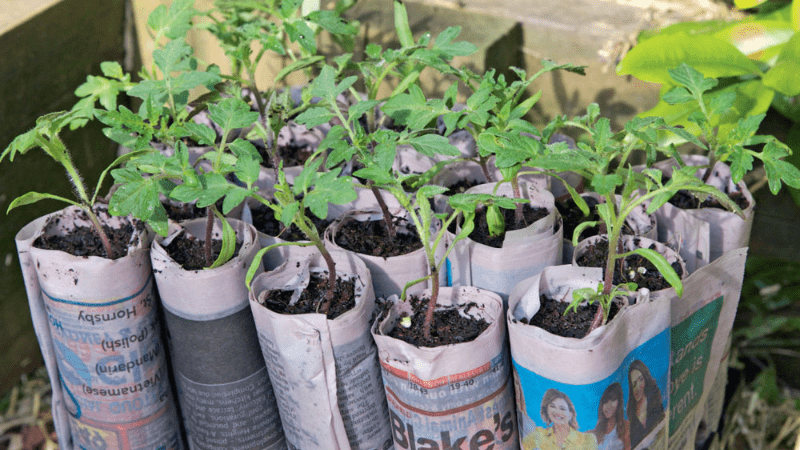
You can use newspapers to obstruct oxygen and sunlight from touching the soil. It will stifle weeds and ensure no new growth of weeds.
Use 10-sheet layers of newspaper on the mulch area of weeds. If weeds regrow, cover the mulch with an additional layer of newspapers.
2. Outdated Bathroom Curtains
Do you have outdated bathroom curtains or any old carpet? Use them on the gap of the weed plants and garden sidewalks. The growth of weeds will be minimized. Keep them on the mulch area too.
3. Corn Gluten Meal


Corn gluten products are effective in blocking the germination process of seeds. Hence, no new seeds will grow, and weeds won’t be able to strive.
4. Vodka
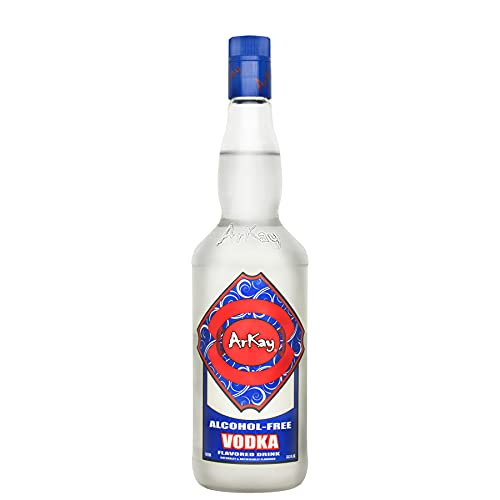

It may seem odd, but it works. Mix 30 ml of vodka, a few drops of liquid soap, and around 500 ml of water together.
It will make them dry quickly. They will struggle to cope up when direct sunlight reaches their body.
5. Boiling water
Burn off weeds by spilling heated water. If your garden’s driveway and pathway have weeds, it is a convenient solution. Boiling water won’t move away easily on such impenetrable areas.
How Long Does It Take For Roundup To Kill Plants Completely?
The approximate timeframe to kill plants is 7–14 days. However, it depends on how much active your weeds are. Also, how thick and strong the weeds are.
No products found.
No products found.
Roundup starts working within 30 minutes. Plants become limps within 3-12 hours. After applying Roundup, you may think it will murder weeds within a few hours. But it will take a minimum of 7 days to kill the plants from top to bottom completely.
Do You Need to Pull Weeds After Roundup?
Yes, it is better to pull weeds after applying Roundup. But you shouldn’t do it immediately.
No products found.
No products found.
Rather, let the product kill the weeds completely. Then use a handy gardening tool to pull weeds and clean the area properly.
Water the area for three days constantly. Then, you may plant your desired plants. However, check whether any Roundup chemical still remains on the soil. For that, test the soil.
Do Vinegar Kill Weeds?
No products found.
No products found.
Vinegar can be one of the finest alternatives to killing annoying weeds. If you remove weeds from your garden in the wrong way, you will not be successful. Using the right tools with the right method is essential to get rid of them.
Does vinegar kill weeds?
Yes, vinegar kills weeds. But vinegar alone may not kill all types of weeds, especially if they have super strong root systems.
However, vinegar is a particular compound that affects all types of weeds since it is non-selective. Hence, make sure you don’t apply it to other plants as it may harm them.
The simplest way to apply vinegar is through a spray bottle. It is uncomplicated and effective.
But, if other plants are closely located with weeds, you should avoid using spray bottles. Instead, you can use a paintbrush and apply the solution to the plant surfaces. Therefore, the solution won’t be spattered on other plants.
Does Salt Kill Weeds?
Salt is not an uncommon DIY solution, which many gardeners have been using. Since it is easily accessible, many nurserymen prefer to use them. Weeds are easily killed by salt because it is water-soluble.
Does salt kill weeds?
Yes, salt kills weeds. When you apply salt on weeds, they absorb the solution through their roots. An imbalanced water system is created, making plants droop and eventually murder them.
The overall growth of weeds is disrupted, and they might be cleared off permanently if you apply them correctly.
Salt kills weeds after how long?
It may take approximately ten days to kill weeds using salts. However, it depends on the type of weeds you want to kill and how effective your salt is. Weeds are commonly killed with table salt, one of the most common salts on the market.
Will Vinegar + Salt Kill Weeds?
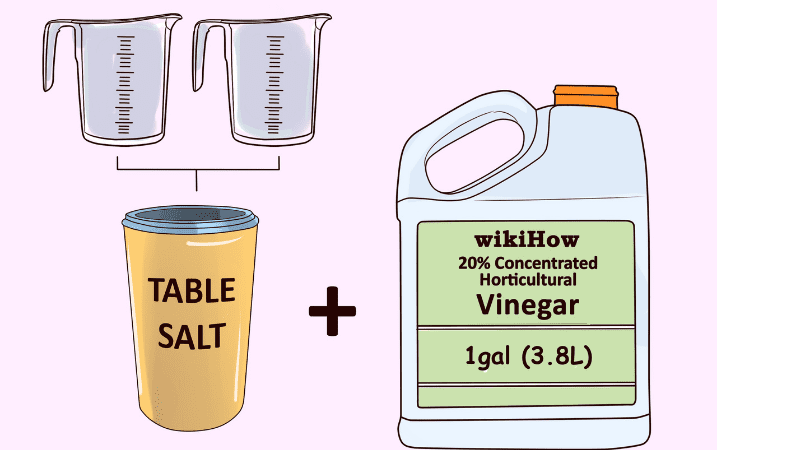
Vinegar alone won’t be effective enough to kill weeds. It doesn’t stop re-growth. That’s why you can mix both vinegar and salt together and apply it to the weeds.
The mixture will kill weeds by drying them out. However, they may still regrow because the solution may dry out before killing the roots fully.
Read More – How To Mix Dish Liquid, Salt & Bleach For Weed Killer? Step By Step Guide
How to Use Vinegar & Salt As a Weed Killer?
- Take a large container and add one 1 gallon of white vinegar. You can use 5% white vinegar, which is most common in households.
- Include 230 ml salt. Stir it until the mixture is dissolved fully.
- Next, add a few drops of mild liquid soap to work as a surface-active agent. The inclusion of soap decreases its surface tension. As a result, the solution will work more efficiently by sticking to the weed’s foliages and roots. Mix well.
- After mixing all the three components properly, pour a few portions of them into a spray container.
- Spray on weeds leaves. Avoid spraying on other plants. Store the remaining mixture to use again. But you should not store them for a long time. Otherwise, the compound won’t be much effective in killing
How to Get Rid of Poison Ivy?
If your surrounding area has an excessive moisture level, you may notice Poison Ivy is growing in your garden. They are extremely harmful to human beings, such as burning skins, causing allergic reactions, etc. Getting rid of them soonest is essential.
Wondering how to get rid of Poison Ivy? You can kill poison ivy by using three different methods.
Chemical herbicides


If Poison Ivy already covered a huge area in your yard, killing them fast is necessary. In such cases, a chemical herbicide won’t be the perfect option to deal with them. Since they are not eco-friendly, be cautious while using them.
Homemade Weed Killers
If you don’t want to use chemical herbicides, you can make a weed killer of your own. Items such as salt, vinegar, mild liquid soap, and freshwater can be used to make the formula.
Weeding
If you prefer to get rid of Poison Ivy manually, weeding is the best option. You must wear all protective equipment to keep yourself safe.


Use a sharp trowel to root out the plants and take them off from their roots. Keep no sign of their existence in your garden.
Conclusion
Hopefully, you have a clear understanding of “Does weed killer kill plant roots?” from the above discussion. Get rid of weeds soonest. Use our tips to do it correctly and properly. Happy Gardening!
Last update on 2023-01-28 / Affiliate links / Images from Amazon Product Advertising API
 |
 |
 |
 |

About Lee Safin
Lee Safin was born near Sacramento, California on a prune growing farm. His parents were immigrants from Russia who had fled the Bolshevik Revolution. They were determined to give their children a better life than they had known. Education was the key for Lee and his siblings, so they could make their own way in the world. Lee attended five universities, where he studied plant sciences and soil technologies. He also has many years of experience in the U.S. Department of Agriculture as a commercial fertilizer formulator.
Thoughts on "Does Weed Killer Kill Plant Roots? How to Kill Weeds Naturally?"
 |
 |
 |
 |
Get FREE Gardening Gifts now. Or latest free toolsets from our best collections.
Disable Ad block to get all the secrets. Once done, hit any button below
 |
 |
 |
 |